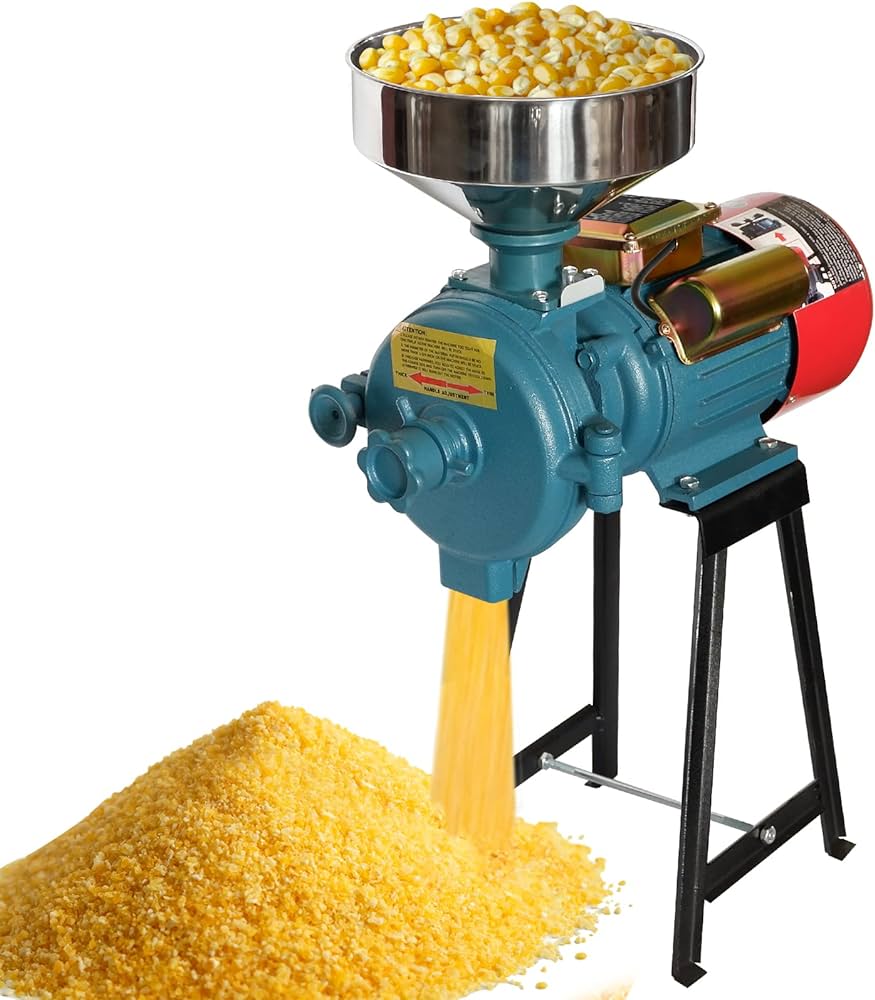To choose the best commercial electric grain grinder, consider factors like grinding capacity, motor power, material quality, and durability.

Credit: www.amazon.com
Factors To Consider When Choosing A Commercial Electric Grain Grinder
When selecting a commercial electric grain grinder, factors to consider include power, capacity, durability, ease of use, and maintenance requirements. By evaluating these aspects, you can choose the best grain grinder that meets your specific needs for efficient and reliable grain processing.
When it comes to running a successful commercial kitchen, having the right equipment is crucial. One such essential piece of equipment is a commercial electric grain grinder. These powerful machines can process large quantities of grain efficiently, saving you time and effort. However, with so many options available in the market, choosing the best one can be daunting. To make your decision easier, consider the following factors:
Grinding Capacity
The grinding capacity of a grain grinder determines how much grain it can process at a time. It is usually measured in pounds per hour. Choosing a grinder with an appropriate grinding capacity is vital to ensure you can meet the demands of your business. Evaluate the quantity of grain you need to process regularly and select a grinder that can handle that volume. Investing in a higher capacity grinder can save you from potential bottlenecks and increase your productivity.
Power And Motor
The power of a commercial electric grain grinder determines its performance and efficiency. Look for a grinder that has a powerful motor, ideally with higher horsepower (HP). A more powerful motor will be able to grind grains quickly and effectively. Additionally, ensure that the motor is durable and can withstand heavy use. Opting for a grinder with a high-quality motor will help you avoid breakdowns or malfunctions, keeping your production line running smoothly.
Durability And Construction
Considering the durability and construction of a grain grinder is crucial, as it directly impacts the machine’s lifespan and overall reliability. Look for a grinder made with sturdy and high-quality materials, such as stainless steel or cast iron. These materials are known for their durability and can withstand the regular wear and tear in a commercial kitchen. Additionally, choose a grinder with a solid construction and robust design to ensure it can handle heavy usage without malfunctioning or requiring frequent repairs.

Credit: www.dustram.com
Types Of Commercial Electric Grain Grinders
In order to choose the best commercial electric grain grinder for your business, it’s important to understand the different types available in the market. Each type of grinder has its own unique features and advantages, which can greatly impact the efficiency and quality of the grinding process. In this section, we will explore the three main types of commercial electric grain grinders: burr grinders, impact grinders, and roller grinders.
Burr Grinders
Burr grinders are widely considered to be the gold standard when it comes to grinding grains. These grinders use two rotating abrasive surfaces, or burrs, to grind the grains into the desired consistency. The burrs can be made of either stainless steel or ceramic, and their adjustable settings allow for precise control over the grind size. This versatility makes burr grinders an ideal choice for businesses that require different grind sizes for various grain-based products.
One of the key advantages of burr grinders is their ability to produce a consistent grind size, which is essential for achieving uniform results and maintaining the quality of the final product. Additionally, burr grinders operate at a relatively low speed, which minimizes heat generation and helps preserve the flavors and nutritional value of the grains.
Impact Grinders
For businesses that prioritize speed and efficiency, impact grinders offer a viable solution. These grinders utilize high-speed rotating blades to pulverize the grains, resulting in a coarse and uniform grind. Impact grinders are often used for grinding larger quantities of grains in a short amount of time, making them suitable for businesses with high production demands.
One of the main advantages of impact grinders is their ability to handle hard grains and legumes, which can be challenging for other types of grinders. However, it’s important to note that the high-speed grinding process can generate heat, and overheating the grains can affect their flavors and nutritional content. Therefore, it’s crucial to use proper cooling mechanisms or grind in smaller batches to minimize heat buildup.
Roller Grinders
Roller grinders, also known as roller mills, are typically used in large-scale industrial operations that require high-capacity grinding. These grinders consist of two or more large metal rollers that crush and grind the grains into smaller particles. Roller grinders are known for their exceptional grinding efficiency and consistent particle size distribution, making them ideal for businesses that focus on producing high-quality flour.
One of the key advantages of roller grinders is their ability to process a wide variety of grains, including wheat, corn, oats, and barley. The adjustable gap between the rollers allows for precise control over the grind size, making it possible to achieve the desired consistency for different types of grains. Additionally, roller grinders often come equipped with advanced features such as automatic feeding and sieving, further enhancing their efficiency and convenience.
When choosing the best commercial electric grain grinder for your business, it’s important to consider factors such as the grinding capacity, versatility, and maintenance requirements. Understanding the different types of grinders available will enable you to make an informed decision that aligns with your specific needs and production goals.
Features And Additional Considerations
When selecting the best commercial electric grain grinder, consider important features like motor power, grinding capacity, and durability. Additionally, pay attention to factors such as ease of use, maintenance requirements, and warranty coverage. Ultimately, a well-rounded grinder will provide efficient and reliable grinding for your commercial needs.
When it comes to choosing the best commercial electric grain grinder, there are several features and additional considerations that should be taken into account. These factors can greatly impact the overall performance and satisfaction you get from your grain grinder. In this article, we will discuss the key features and considerations to help you make an informed decision.
Grind Settings
One of the most important features to consider when choosing a commercial electric grain grinder is the availability of different grind settings. Whether you need a fine or coarse grind, having versatile options can significantly enhance the versatility and functionality of your grinder. Look for a grain grinder with adjustable grind settings that can cater to a variety of grains and applications.
Ease Of Use And Cleaning
Another crucial consideration is the ease of use and cleaning of the grain grinder. A user-friendly design can save time and effort, especially in busy commercial settings. Consider features such as a clear and intuitive control panel, easy-to-read indicators, and a straightforward grinding process. The grinder should also be easy to disassemble for thorough cleaning to ensure proper hygiene and maintenance.
Noise Level
Noise level is an important factor to consider, especially if the grain grinder will be used in a retail or customer-facing environment. Excessive noise can create discomfort for both customers and employees. Look for a grain grinder that incorporates noise reduction technology or features a quiet motor to minimize noise pollution and maintain a pleasant working environment.
Warranty And Customer Support
Lastly, when investing in a commercial electric grain grinder, it is essential to consider the warranty and customer support provided by the manufacturer. A reliable warranty can offer peace of mind, knowing that the manufacturer stands behind their product. Additionally, prompt and efficient customer support can prove invaluable in resolving any potential issues or concerns that may arise during the lifespan of the grinder. Look for a reputable brand that offers a generous warranty and responsive customer support.

Credit: www.dustram.com
Frequently Asked Questions On How To Choose Best Commercial Electric Grain Grinder
Can A Commercial Electric Grain Grinder Be Used For Home Purposes?
Yes, a commercial electric grain grinder can be used for home purposes. It offers high-speed grinding, large capacity, and durability, making it suitable for home use, especially if you frequently grind large quantities of grains for baking or cooking. However, keep in mind that commercial grinders may be larger and louder than regular home grinders.
What Factors Should I Consider When Choosing A Commercial Electric Grain Grinder?
When choosing a commercial electric grain grinder, consider factors such as grinder capacity, motor power, grinding speed, ease of use and cleaning, durability, and warranty. Additionally, pay attention to grinding settings and options, as well as safety features like overload protection and anti-slip feet.
Evaluating customer reviews and ratings can also help in making an informed choice.
Are Commercial Electric Grain Grinders Suitable For Grinding All Types Of Grains?
Yes, commercial electric grain grinders are designed to grind a variety of grains, including wheat, corn, rice, oats, barley, and more. They can handle both hard and soft grains with ease, ensuring consistent and uniform grinding results. However, always check the product specifications to ensure the specific grain you want to grind is suitable for the grinder you’re considering.
Conclusion
To sum up, finding the best commercial electric grain grinder requires careful consideration of various factors. It is vital to assess the grinder’s motor power, capacity, durability, and ease of use. Additionally, considering noise levels, maintenance requirements, and customer reviews can help in making an informed decision.
Remember to prioritize your specific grinding needs and preferences to select a reliable and efficient grain grinder that will meet your requirements.

